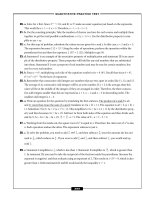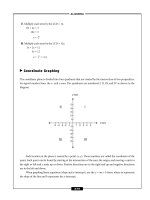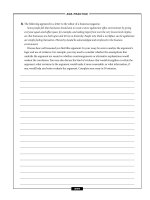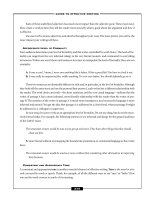GMAT exam success Episode 1 Part 9 pdf
Bạn đang xem bản rút gọn của tài liệu. Xem và tải ngay bản đầy đủ của tài liệu tại đây (119.01 KB, 20 trang )
PRESENT PAST PAST PARTICIPLE
shake shook shaken
take took taken
forget forgot forgotten
get got gotten
give gave given
forgive forgave forgiven
forsake forsook forsaken
hide hid hidden
ride rode ridden
write wrote written
freeze froze frozen
steal stole stolen
SAME PRESENT AND PAST PARTICIPLE FORMS
PRESENT PAST PAST PARTICIPLE
come came come
overcome overcame overcome
run ran run
In English, as in many other languages, the essential verb to be is also highly irregular:
SUBJECT PRESENT PAST PAST PARTICIPLE
I am was have been
you are were have been
he, she, it is was has been
we are were have been
they are were have been
– VERB FORMS–
149
Helping Verbs
Helping verbs (also called auxiliary verbs) are essential to clear communication. They enable us to indicate
exactly when an action took place or will take place and suggest very specific meanings, such as the subject’s
ability to perform an action or intention to do something. Helping verbs are used to form the future (e.g.,
will call) and conditional tenses:
Future: I will call you tomorrow with the results.
Conditional: If the results were promising, Jamal would have requested another.
The following table lists the helping verbs, their forms, and their meanings. Review this table carefully;
a helping verb can often significantly change the meaning of a sentence.
PRESENT
AND FUTURE PAST MEANING EXAMPLES
will, shall would intention She will
meet us at the hotel.
They said they would call first.
can could ability I can
be there in ten minutes.
Rose could only find one glove.
may, might, could, might permission May
I tag along?
can, could Could we get together after the meeting?
should should ؉ have ؉ recommendation We should
leave before the snow starts.
past participle They should have known better.
must, have (to) had (to) necessity I must
go to the dentist.
I had to
draw two models.
should should ؉ have ؉ expectation They should
be on the next train.
past participle They should have been on that train.
may, might might ؉ have ؉ possibility They may
be lost.
past participle They might have gotten lost.
Subjunctive Mood
The subjunctive mood is one of the verb forms that is often forgotten in conversation and is therefore often
neglected in writing. Like helping verbs, the subjunctive is used to express a specific meaning, indicating
– VERB FORMS–
150
something that is wished for or that is contrary to fact. It is formed by using were instead of was as in the fol-
lowing examples:
If she w
ere a little more experienced, she would get the promotion. (She is not a little more
experienced.)
If I w
ere rich, I would travel the world. (Unfortunately, I am not rich.)
If you w
er
e in my shoes, you wouldn’t say such a thing. (You are not in my shoes.)
Troublesome Verbs
Three verb pairs are particularly troublesome:
lie / lay
sit / set
rise / raise
The key to knowing which verb to use is remembering which verb takes an object. In each pair, one verb
is transitive
—
an object receives the action
—
whereas the other is intransitive
—
the subject itself receives or
performs the action. For example, lie is intransitive; the subject of the sentence performs the action on itself:
I will lie down. The transitive verb laid, on the other hand, is an action that the subject of the sentence per-
forms upon an object: He lay the baby down in the crib. In the following examples, the subjects are in bold
and the objects are underlined:
lie: to rest or recline (intransitive
—
subject only)
lay: to put or place (transitive
—
needs an object)
I will lie down for a while.
Will you please lay the p
apers on the table.
sit: to rest (intransitive
—
subject only)
set: to put or place (transitive
—
needs an object)
Why don’t we sit down and talk this over?
He will set the r
ecord straight.
rise: to go up (intransitive
—
subject only)
raise: to move something up (transitive
—
needs an object)
The sun will rise at 5:48
A.M. tomorrow.
He raised the r
ent to $750 per month.
– VERB FORMS–
151
The basic forms of these verbs can also be a bit tricky. The following table shows how each verb is conjugated.
PRESENT PRESENT PARTICIPLE PAST PAST PARTICIPLE
(WITH AM, IS, AND ARE) (WITH HAVE, HAS, AND HAD)
lie, lies lying lay lain
lay, lays laying laid laid
sit, sits sitting sat sat
set, sets setting set set
rise, rises rising rose risen
raise, raises raising raised raised
Gerunds and Infinitives
Gerunds lo
ok
like verbs because they end in -ing, but they actually function as nouns in sentences:
Tracy loves camping
.
Here, the action (verb) Tracy performs is loves. The thing (noun) she enjoys is camping. In the follow-
ing sentence, however, camping is the action Tracy performs, so it is functioning as a verb, not as a gerund:
Tracy is camping
in the Pine Barrens next week.
Words ending in -ing can also function as adjectives:
Some of our camping
gear needs to be replaced before our trip.
This means is that you cannot count on word endings to determine a word’s part of speech; you must
look instead at how the word is functioning in the sentence.
Infinitives are the base (unconjugated) form of the verb preceded by to: to be, to delay, to manage, and
so on. They are often part of a verb chain, but they are not the main verb (main action) of a sentence:
Priya likes t
o write poems.
In this example, likes is the main verb; what Priya likes (the action she likes to take) is to write poems.
– VERB FORMS–
152
When to Use Infinitives and Gerunds
In many situations, you may be uncertain whether to use an infinitive or a gerund. Which is correct: I like to
swim or I like swimming? In this case, both are correct; like, hate, and other verbs that express preference can
be followed by either a gerund or infinitive. But other verbs can only be followed by one or the other. Here
are a few helpful guidelines:
■
Always use a gerund after a preposition:
Keza thought that b
y taking the train, she would save money and time.
Noriel was afraid o
f off
ending her host.
■
Always use a gerund after the following verbs:
admit dislike practice
appreciate enjoy put off
avoid escape quit
cannot help finish recall
consider imagine resist
delay keep risk
deny miss suggest
discuss postpone tolerate
We should discuss b
uying a new computer.
I am going to quit smo
king.
■
In general, use an infinitive after these verbs:
agree decide need refuse
ask expect offer venture
beg fail plan want
bother hope pretend wish
claim manage promise
Aswad promises t
o be back by noon.
Fatima failed t
o keep her promise.
■
When a noun or pronoun immediately follows these verbs, use an infinitive:
advise command force remind want
allow convince need require warn
ask encourage order tell
cause expect persuade urge
I would like you t
o reconsider my offer.
The committee needs Tom t
o organize this event.
– VERB FORMS–
153
mine the meaning of unfamiliar vocabulary words. The following tables list common prefixes, suffixes, and
word roots; their meanings; an example of a word with that prefix, suffix, or word root; the meaning of that
word; and a sentence that demonstrates the meaning of that word. Refer to this chapter often to refresh your
memory and improve your vocabulary.
Prefixes
A prefix is a syllable added to the beginning of a word to change or add to its meaning. The following table
lists some of the most common prefixes in the English language. They are grouped together by similar
meanings.
CHAPTER
Prefixes,
Suffixes, and
Word Roots
10
155
PREFIX MEANING EXAMPLE DEFINITION SENTENCE
uni- one unify (v) to form into a single The new leader was able
unit; to unite to unify the three factions into
one strong political party.
mono- one monologue a long speech by I was very moved by the
(n) one person or monologue in Scene III.
performer
bi- two bisect (v) to divide into two If you bisect a square, you will
equal parts get two rectangles of equal
size.
duo- two duality (n) having two sides The novel explores the duality
or parts of good and evil in humans.
tri- three triangle (n) a figure having In an isosceles triangle, two of
three angles the three angles are the same
size.
quadri- four quadruped (n) an animal with four Some quadrupeds evolved
feet into bipeds.
tetra- four tetralogy (n) series of four related “Time Zone” was the fourth
artistic works and final work in Classman’s
tetralogy.
quint- five quintuplets (n) five offspring born Each quintuplet weighed less
at one time than four pounds at birth.
pent- five pentameter (n) a line of verse Most of Shakespeare’s sonnets
(poetry) with five are written in iambic
metrical feet pentameter.
multi- many multifaceted having many sides This is a multifaceted issue,
(adj) and we must examine each
side carefully.
poly- many polyglot (n) one who speaks or It is no wonder he is a
understands several polyglot; he has lived in eight
languages different countries.
– PREFIXES, SUFFIXES, AND WORD ROOTS–
156
PREFIX MEANING EXAMPLE DEFINITION SENTENCE
omni- all omniscient knowing all Dr. Perez seems omniscient;
(adj) she knows what all of us are
thinking in class.
micro- small microcosm (n) little or miniature Some people say that Brooklyn
world; something Heights, the Brooklyn district
representing something across the river from the Wall
else on a very small Street area, is a microcosm of
scale Manhattan.
mini- small minority (n) small group within a John voted for Bridget, but he
larger group was in the minority; most peo-
ple voted for Elaine.
macro- large macrocosm (n) the large scale world Any change to the macrocosm
or universe; any great will eventually effect the
whole microcosm.
ante- before anticipate (v) to give advance His decades of experience
thought to; foresee; enabled him to anticipate the
expect problem.
pre- before precede (v) to come before in The appetizers preceded the
time or order main course.
post- after postscript (n) message added after His postscript was almost as
the close of a letter long as his letter!
inter- between intervene (v) to come between Romeo, trying to make peace,
intervened in the fight between
Tybalt and Mercutio.
inter- together interact (v) to act upon or The psychologist took notes as
influence each other she watched the children
interact.
intra- within intravenous within or into a vein She could not eat and had to
(adj) be fed intravenously for three
days.
intro- into, within introvert (n) a person whose Unlike his flamboyant sister,
attention is largely quiet Zeke was a real
directed inward, toward introvert.
himself or herself; a shy
or withdrawn person
– PREFIXES, SUFFIXES, AND WORD ROOTS–
157
PREFIX MEANING EXAMPLE DEFINITION SENTENCE
in- in, into induct (v) to bring in (to a group) She was inducted into the
honor society.
ex- out, from expel (v) to drive out or away Let us expel the invaders!
circum- around circumscribe (v) to draw a line around; She carefully circumscribed
to mark the limits of the space that would become
her office.
sub- under subvert (v) to bring about the His attempt to subvert my
destruction of, authority will cost him his job.
overthrow; to undermine
super- above, over supervisor (n) one who watches over Alex refused the promotion to
supervisor because he did not
feel comfortable being his
friends’ boss.
con- with, together consensus (n) general agreement After hours of debate, the group
finally reached a consensus
and selected a candidate.
non- not nonviable (adj) not able to live The farmer explained that the
or survive seedling was nonviable.
in- not invariable (adj) not changing The weather here is invariable—
always sunny and warm.
un- not, against unmindful (adj) not conscious For better or worse, he is
or aware of; forgetful unmindful of office politics.
contra- against contradict (v) to state that (what is I know we do not have to agree
said) is untrue; to state on everything, but she
the opposite of contradicts everything I say.
anti- against, antipode (n) exact or direct North is the antipode of south.
opposite opposite
counter- against, counter- working against Complaining is counter-
opposing productive (adj) production productive.
dis- away, dispel (v) to drive away To dispel rumors that I was
quitting, I scheduled a series
of meetings for the next three
months.
– PREFIXES, SUFFIXES, AND WORD ROOTS–
158
PREFIX MEANING EXAMPLE DEFINITION SENTENCE
dis- not, opposite of disorderly (adj) not having order; Two people were hurt when the
messy, untidy, crowd became disorderly
uncontrolled, or during the protest.
unruly
mis- wrong, ill misuse (v) to use wrongly She misused her authority
when she reassigned Charlie to
a new team.
mal- bad, wrong maltreat (v) to treat badly After the dog saved his life, he
or wrongly swore he would never maltreat
another animal.
mal- ill malaise (n) feeling of discomfort The malaise many women feel
or illness during the first few months of
pregnancy is called morning
sickness.
pseudo- false, fake pseudonym (n) false or fake name Mark Twain is a pseudonym for
Samuel Clemens.
auto- by oneself automaton (n) a robot; a person The workers on the assembly
or by itself who seems to act line looked like automatons.
mechanically and
without thinking
co- together with, cohesive (adj) having a tendency Though they came from
jointly to bond or stick different backgrounds, they
together; united have formed a remarkably
cohesive team.
– PREFIXES, SUFFIXES, AND WORD ROOTS–
159
Suffixes
A suffix is a syllable added to the end of a word to change or add to its meaning. The following table lists some
of the most common suffixes in the English language. They are grouped together by similar meanings.
SUFFIX MEANING EXAMPLE DEFINITION SENTENCE
-en to cause broaden (v) to make more Traveling around the world will
to become broad; to widen broaden your understanding of
other cultures.
-ate to cause resuscitate (v) to bring or come Thanks to a generous gift from
to be back to life or an alumnus, we were able to
consciousness; resuscitate the study-abroad
to revive program.
-ify/-fy to make or electrify (v) to charge with The singer electrified the
cause to be electricity audience with her
performance.
-ize to make, alphabetize (v) to put in alphabetical Please alphabetize these files
to give order for me.
-al capable of, practical (adj) suitable for use; He has years of practical,
suitable for involving activity, on-the-job experience.
as distinct from study
or theory
-ial pertaining to commercial of or engaged Commercial vehicles must
(adj) in commerce have special license plates.
-ic pertaining to aristocratic of or pertaining Though he was never rich or
(adj) to the aristocracy powerful, he has very
aristocratic manners.
-ly resembling, tenderly (adv) done with tenderness; He held the newborn baby
having the gently, delicately, and tenderly in his arms.
qualities of lovingly
-ly in the manner boldly (adv) in a bold manner Despite his fear, he stepped
of boldly onto the stage.
-ful full of meaningful significant; When Robert walked into the
(adj) full of meaning room with Annette, she cast
me a meaningful glance.
– PREFIXES, SUFFIXES, AND WORD ROOTS–
160
SUFFIX MEANING EXAMPLE DEFINITION SENTENCE
-ous, -ose full of humorous (adj) full of humor; funny His humorous speech made
the evening go by quickly.
-ive having the descriptive (adj) giving a description The letter was so descriptive
quality of that I could picture every place
he had been.
-less lacking, painless (adj) without pain; The doctor assured me that it
free of not causing pain is a painless procedure.
-ish having the childish (adj) like a child; unsuitable He did not get the job because
quality of for a grown person of his childish behavior during
the interview.
-ance/ quality or tolerance (n) willingness or ability He has a high level of
-ence state of to tolerate a person tolerance for rudeness.
or thing
-acy quality or indeterminacy state or quality of The indeterminacy of his state
state of (n) being undetermined ment made it impossible to tell
(without defined limits) which side he was on.
or vague
-tion act, state, completion (n) the act of completing; The second siren signaled the
or condition of the state of being completion of the fire drill.
completed or finished
-or/-er one who does narrator (n) one who tells the story; A first-person narrator is
or performs the gives an account of usually not objective.
action of
-atrium/ place for arboretum a garden devoted They built a deck with an
-orium (n) primarily to trees arboretum for their bonsai tree
and shrubs collection.
-ary place for, sanctuary (n) a sacred place; refuge With three noisy roommates,
pertaining to Ellen frequently sought the
quiet sanctuary of the library.
-cide kill pesticide (n) substance for killing This pesticide is also
insects dangerous for humans.
– PREFIXES, SUFFIXES, AND WORD ROOTS–
161
SUFFIX MEANING EXAMPLE DEFINITION SENTENCE
-ism quality, state, optimism (n) belief that things Her optimism makes people
or condition will turn out for the want to be around her.
of; doctrine of best; tendency to take
a hopeful view of things
-ity quality or morality (n) state or quality He argued that the basic
state of of being moral morality of civilized societies
has not changed much over
the centuries.
-itis inflammation tonsillitis (n) inflammation and Her tonsillitis was so severe
of infection of the that doctors had to remove her
tonsils tonsils immediately.
-ment act or judgment (n) ability to judge or He exercised good judgment
condition of make decisions wisely; by keeping his mouth shut
act of judging during the meeting.
-ology the study of zoology (n) the scientific study She took a summer job at the
of animal life zoo because of her strong
interest in zoology.
Common Latin Word Roots
Many words in the English language derive from Latin. The following table shows the original Latin words
that are used to create various English words. The Latin words serve as roots, providing the core meaning of
the words; prefixes, suffixes, and other alterations give each word its distinct meaning. The word roots are
listed in alphabetical order.
ROOT MEANING EXAMPLE DEFINITION SENTENCE
amare to love amorous (adj) readily showing She told him to stop his
or feeling love amorous advances, as she
was already engaged.
audire to hear audience (n) assembled group of The audience was stunned
listeners or spectators; when the game show host
people within hearing slapped the contestant.
– PREFIXES, SUFFIXES, AND WORD ROOTS–
162
ROOT MEANING EXAMPLE DEFINITION SENTENCE
bellum war belligerent inclined to fight; The citizens feared that their
hostile, aggressive belligerent leader would start
an unjust war.
capere to take captivate (v) to capture the fancy of The story captivated me from
the beginning; I could not put
the book down.
dicere to say, speak dictate (v) to state or order; She began to dictate her notes
to say what needs to into the microphone.
be written down
duco to lead conduct (v) to lead or guide He conducted a detailed tour
(thorough) of the building.
equus equal equilibrium (n) a state of balance I have finally achieved an
equilibrium between work
and leisure.
facere to make manufacture (v) to make or produce The clothes are manufactured
or do here in this factory.
lucere to light lucid (adj) very clear No one could possibly have
misunderstood such a lucid
explanation.
manus hand manicure (n) cosmetic treatment To take care of her long finger-
of the fingernails nails, she gets a manicure
every week.
medius middle median (adj) middle point; middle The median household income
in a set of numbers in this wealthy neighborhood is
$89,000.
mittere to send transmit (v) to send across The message was transmitted
over the intercom.
omnis all; every omnipresent present everywhere That top-40 song is
(adj) omnipresent; everywhere I go,
I hear it playing.
plicare to fold application (n) putting one thing on His loan application was
another; making a denied because of his poor
formal request credit history.
– PREFIXES, SUFFIXES, AND WORD ROOTS–
163
ROOT MEANING EXAMPLE DEFINITION SENTENCE
ponere/ to place position (n) the place a person Although he is only 22, he
positum or thing occupies holds a very powerful position
in the company.
protare to carry transport (v) to carry across The goods will be transported
by boat.
quarere to ask or inquiry (n) act of inquiry, The inquiry lasted several
question investigation, months but yielded no new
or questioning information.
scribere to write scribe (n) person who makes The scribe had developed
copies of writings thick calluses on his fingers
from years of writing.
sentire to feel sentient (adj) capable of feeling No sentient beings should be
used for medical research.
specere to look at spectacle (n) striking or impressive The debate was quite a
sight spectacle—you should have
seen the candidates attack one
another.
spirare to breathe respiration (n) the act of breathing His respiration was steady, but
he remained unconscious.
tendere to stretch extend (v) to make longer; Please extend the deadline by
stretch out two weeks so we can complete
the project properly.
verbum word verbatim (adv) word for word The student failed because she
had copied an article verbatim
instead of writing her own
essay.
Common Greek Word Roots
Many other English words are derived from the ancient Greek language. The following table shows the Greek
words that are used to create various English words. The Greek words serve as roots, providing the core mean-
ing of the words; prefixes, suffixes, and other alterations give each word its distinct meaning. The word roots
are listed in alphabetical order.
– PREFIXES, SUFFIXES, AND WORD ROOTS–
164
ROOT MEANING EXAMPLE DEFINITION SENTENCE
bios life biology (n) the science of He is majoring in biology and
living organisms plans to go to medical school.
chronos time chronological arranged in the order The story is confusing because
(adj) in which things she did not put the events in
occurred chronological order.
derma skin dermatology (n) branch of medical She has decided to study
science dealing with dermatology because she has
the skin and its always been plagued by
diseases rashes.
gamos marriage, polygamy (n) the practice or custom Throughout history, certain
union of having more than cultures have practiced
one spouse or mate polygamy, but it is uncommon
at a time today.
genos race, sex, genocide (n) deliberate extermination The recent genocide in Bosnia
kind of one race of people has created a sharp increase in
the number of orphaned
children.
geo earth geography (n) the study of the Earth’s The geography of this region
surface; the surface or made it difficult for the different
topographical features tribes to interact.
of a place
graphein to write calligraphy (n) beautiful or elegant She used calligraphy when
handwriting she addressed the wedding
invitations.
krates member of democrat (n) one who believes in I have always been a
a group or advocates democ- democrat, but I refuse to join
racy as a principle the Democratic Party.
of government
kryptos hidden, cryptic (adj) concealing meaning; He left such a cryptic message
secret puzzling on my answering machine that
I don’t know what he wanted.
metron to measure metronome (n) device with a pendulum She used a metronome to
that beats at a deter- help her keep the proper pace
mined rate to measure as she played the song.
time/rhythm
– PREFIXES, SUFFIXES, AND WORD ROOTS–
165
ROOT MEANING EXAMPLE DEFINITION SENTENCE
morphe form polymorphous having many forms Most mythologies have a
(adj) polymorphous figure, a “shape
shifter” who can be both ani-
mal and human.
pathos suffering, pathetic (adj) arousing feelings Willy Loman is a complex
feeling of pity or sadness character who is both pathetic
and heroic.
philos loving xenophile (n) a person who is Alex is a xenophile; I doubt he
attracted to foreign will ever come back to the
peoples, cultures, States.
or customs
phobos fear xenophobe (n) person who fears Don’t expect Len to go on the
or hates foreigners trip; he is a xenophobe.
or strange cultures
or customs
photos light photobiotic living or thriving only Plants are photobiotic and will
(adj) in the presence of light die without light.
podos foot podiatrist (n) an expert in diagnosis The podiatrist saw that the
and treatment of ingrown toenail had become
ailments of the human infected.
foot
psuedein to deceive pseudonym (n) false name Was George Eliot a pseudo-
nym for Mary Ann Evans?
pyr fire pyromaniac (n) one who has a The warehouse fire was not an
compulsion to set accident; it was set by a
things on fire pyromaniac.
soma body psychoso- of or involving both In a psychosomatic illness,
matic (adj) the mind and body physical symptoms are caused
by emotional distress.
– PREFIXES, SUFFIXES, AND WORD ROOTS–
166
ROOT MEANING EXAMPLE DEFINITION SENTENCE
tele distant telescope (n) optical instrument for While Galileo did not invent the
making distant objects telescope, he was the first to
appear larger and use it to study the planets and
nearer when viewed stars.
through the lens
therme heat thermos (n) insulated jug or bottle The thermos kept my coffee
that keeps liquids hot all afternoon.
hot or cold
– PREFIXES, SUFFIXES, AND WORD ROOTS–
167









